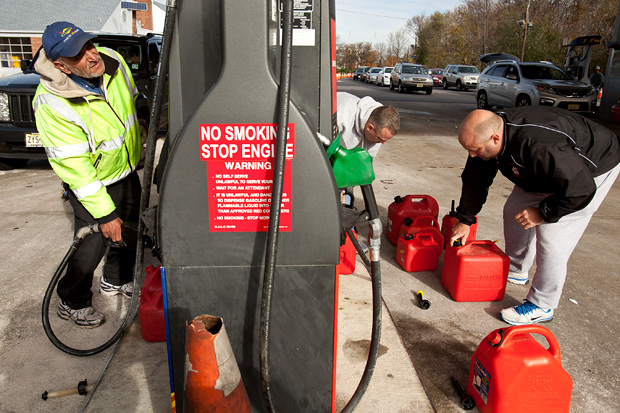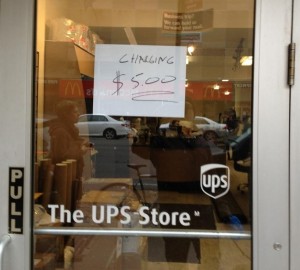
The $35 Shower and Other Tales of the Hurricane Economy
Nikhil Hutheesing

Photograph by Emile Wamsteker/Bloomberg
People at a Sunoco Inc. station in Bloomfield, New Jersey, on Nov. 1, 2012.
As the New York area starts the heavy task of cleaning up after Hurricane Sandy, others may be trying to clean up as well, though perhaps not admirably. In New York, a number of corporate employees, from companies such as Goldman Sachs to those here at Bloomberg, found themselves forced to stay in New York City hotels in the days after the storm–at hurricane prices.
CNBC, for instance, reported that NBC News Staffers who had booked rooms in midtown Manhattan for $269 per day before the storm saw the rate rise to $679 per night after the storm. Twitter has been in uproar over hotel price-gouging. Lisa Paravano (@LParavano) tweeted on October 30th:
“horrible price-gouging happening at NYC hotels…shame on @Marriott for charging my stranded outta towners $1K per night?!” *Update below
Aside from hotels, already expensive parking garages suddenly seem more expensive. Jorge Wilmer, an investment banker in New York, parked his car at the MPS Parking Garage on East 48th Street off Park Avenue on October 31. The fee came to $73 including taxes. “Seemed unusually steep to me,” says Wilmer. “The guy before me also thought the price was too high.” A call to MPS confirmed the price; the attendant insisted that $73 was not a jacked-up rate, but the normal fee for three hours.
For others without power and water, taking a shower could do more than just make them cleaner — it could also clean them up. On October 30, the Equinox Health Club on East 54th Street, where monthly dues run up to $183 per month, were offering non-members showers. It wasn’t an act of kindness: The price for a shower: $35. This at the same time the club was also offering free workouts to those stranded hoping, no doubt, to convert them into paying members.
Hurricanes and price gouging often go hand-in hand. In 2004, The New York Times and Bloomberg reported that after Hurricane Charley hit Florida, gas stations hiked their fees up to $3 per gallon instead of the going $1.78 per gallon. Hotels charged three times the regular rate. In 2011, when Hurricane Irene tore through New Jersey, the Allstate New Jersey Insurance company, according to the Associated Press, said that its customers were charged thousands of dollars to pump water out of basements when such a job would ordinarily cost just hundreds of dollars.
With those kinds of stories in mind, governments have taken a harsh line. New York’s attorney general warned vendors against price increases in things like food, gas, and batteries as the hurricane approached. New Jersey state law limits price increases in emergency times to 10 percent. The state is deploying a team of investigators to scout out gas stations that are accused of raising their prices by 20 percent in one day as well as hardware stores that doubled the price they charged for generators overnight.
Worth asking here is whether the reality of “price gouging” matches the nightmare scenario of storm victims left hungry and shivering envisioned by the law. Look into some of the accusations and the storm prices are closer to ordinary ones than you might guess. $73 for three hours of parking is steep, but not as crazy as it might sound to those from outside New York. The average midtown Manhattan price for three hours of garage parking is $19 an hour, or $38 for a full day, according to Colliers International, a commercial real estate services company.
On Twitter, Virginian David Evers (@DaveNYC2DC) , complains about hotel prices:
“Hotels are price gouging!! Charging $150-200 a night for rooms that normally cost $75-80.”
Maybe, but $75-80 is certainly on the low end for a Washington, D.C.-area hotel. At the New York Marriott East Side where Lisa Paravano’s friends were trying to stay, a reservations clerk said that a rate could indeed have been $1,000 a night if only the “executive suites” were left available. For tonight, a search on the Marriott hotels site turned up no rooms in New York City at any price.
About those $35 showers? $35 may not be out of line for a day rate at a New York health club. Tellingly, the club put the brakes on the service the following day. “We were overloaded by people coming in to shower so we’re not providing that service right now,” said an employee who answered the phone on October 31. Is it price gouging if there are so many people willing to pay the price you still can’t deal with the crush?
Economists and economics writers from across the political spectrum often take a more lenient view of price increases than governments. Price rises are one way of dealing with basic problem of emergency scarcity–and they can increase supply, whether of showers or of gas (if, say it gets trucked in from out of state). So why all the anger, and the government warnings, especially if some of the cases are borderline?
Maybe because in times of crisis it’s not all about maximizing the number of people who can take showers or making the gasoline lines shorter. It’s also about a sense of cohesion, or what Bloomberg View’s Toby Harshaw (a defender of price increase for scarce goods), calls the “come-together attitude.” It’s in times of crisis that social cohesion is most in danger of breaking down, and also when it’s most needed.
That’s a message governments try to send out with strong words, such as New Jersey Governor Chris Christie’s plea that, “During emergencies, New Jerseyans should look out for each other – not seek to take advantage of each other.” And with warnings of stronger penalties: The fine for excessive price increases in New Jersey is $10,000 for a first offense.

Photograph by J. Finn
A sign on a UPS store in New York, demanding five dollars for cell phone charging.
Update: More data points continue to flow in on hurricane pricing. A UPS store on Eighth Avenue in Chelsea had a sign asking five dollars for cell phone charging. The photo, posted on Facebook and passed on by Lisa Pavarano, is here. Not exactly illegal price-gouging, but not a shining example of citizen altruism, either. The sign has since been taken down. When I called today, the store said that people could charge their phones for free.
Marriott’s corporate office couldn’t immediately be reached for comment before the post went up. A Marriott spokesman emailed to say that the company has a corporate policy against price-gouging and “prohibits hotels from raising rates in excess of normal retail rates sold within the preceding 30 days of a disaster or significant event.” Worth noting: a check on the hotel website showed a standard rate of $1,200 for an executive suite booked a month in advance.
